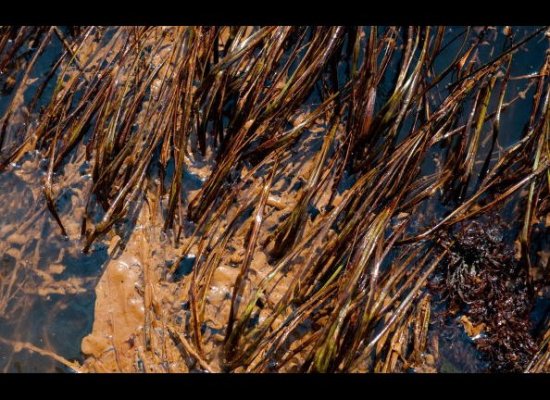Today, government scientists have once more revised upward to 35,000 - 60,000 barrels a day their estimate of the rate of oil released into the Gulf of Mexico from the BP deep well that blew out in a disastrous explosion off the Louisiana coast two months ago (Stephen Power, John Kell and Siobhan Hughes, "BP, Oil Industry Take Fire at Hearing", The Wall Street Journal; Justin Gillis, "Estimates of Oil Flow Jump Higher", The New York Times). The incident has become the largest oil spill that this country has experienced to date. Gigantic clouds of dispersed oil lurk deep under the surface of the Gulf. No one knows where the oil will show. Blobs of oil have washed onshore in Louisiana, Mississippi, Alabama and the Northwestern beaches of Florida. Fragile marshes are drenched in oil. Wildlife is suffering. Businesses in fishery and tourism are severely affected. The impact of the catastrophe cannot yet be estimated.
The oil spill and its consequences reminded me of the wise words of the eminent German zoo director, conservationist and co-founder of the Serengeti National Park Bernhard Grzimek. He wrote in his bestseller "Serengeti Shall Not Die":
“Large cities continue to proliferate. In the coming decades and centuries, men will not travel to view marvels of engineering, but they will leave the dusty towns in order to behold the last places on earth where God’s creatures are peacefully living. Countries which have preserved such places will be envied by other nations and visited by streams of tourists. There is a difference between wild animals living a natural life and famous buildings. Palaces can be rebuilt if they are destroyed in wartime, but once the wild animals of the Serengeti are exterminated no power on earth can bring them back.”Bernhard Klemens Maria Grzimek was born Apr. 24, 1909. He studied veterinary medicine at the University of Leibzig and Humboldt University, Berlin, where he received his doctorate in 1933. In 1945, he was appointed to the post of director at the Frankfurt Zoo, which he helped rebuild and transform into one of the most formidable zoological gardens. He continued to hold the directorship until his retirement and served as president of the Frankfurt Zoological Society for more than four decades. He passed away shortly before his 78th birthday on Mar. 13, 1987.
In addition to writing books on African wildlife, he compiled a comprehensive multi-volumed encyclopedia on animals and their habitat entitled "Grzimek's Animal Life Encyclopdia" and co-edited with the Nobel Prize-laureate Konrad Lorenz the ethological journal "Das Tier".
For decades, Prof. Grzimek hosted a popular weekly TV program in Germany that captivated an audience of millions. He brought live animals to the show and built the storyline around the special guest of that evening. I vividly remember him hosting a chimpanzee, opening our minds to the minds of one of our closest relatives.
Prof. Grzimek's was an outstanding fundraiser. Because of his effort, the Frankfurt Zoo accomplished to build excellent primate facilities. As a student, I spent quite a few hours there, and my observations would prepare me for later experiences.
In addition to his work for the zoo, Prof. Grzimek was deeply passionate about preserving the habitat of animals living on sub-Saharan grasslands. He raised substantial funds for the Serengeti National Park through his books, documentaries and TV program. His son Micheal died in an airplane crash on a mission to survey animal migration there. Father and son are commemorated with a monument on the rim of the park's Ngoro-Ngoro Crater. Watching the environmental catastrophe unfold in the Gulf, we should remember this man's wise words. They apply to the Serengeti as much as to the Gulf.
Addendum
- This New York Times video by Jeffrey Gettleman and Sven Torfinn with the title "Highway Across the Serengeti" posted online today presents supporters and opponents of the highway project and shows the venue (10/30/10):
Related Posts








